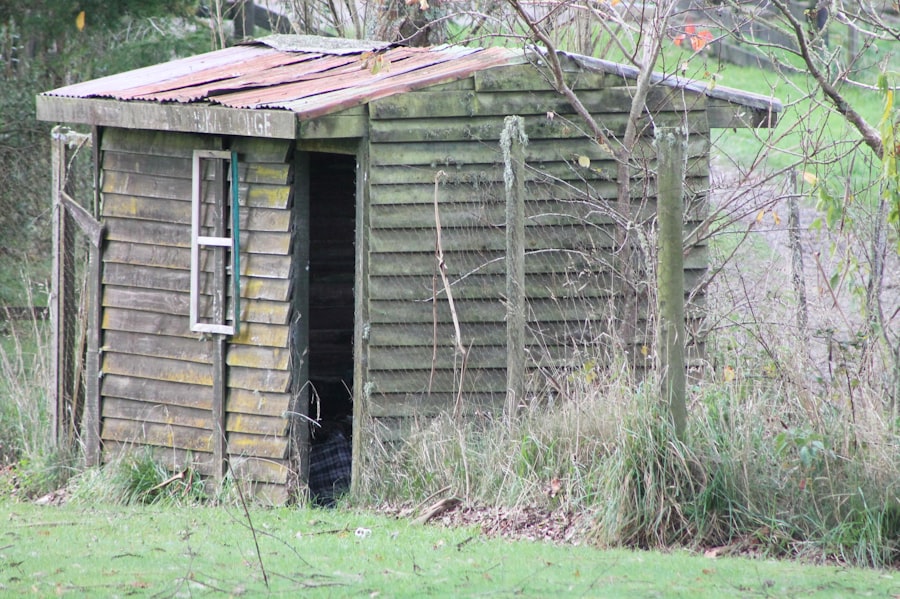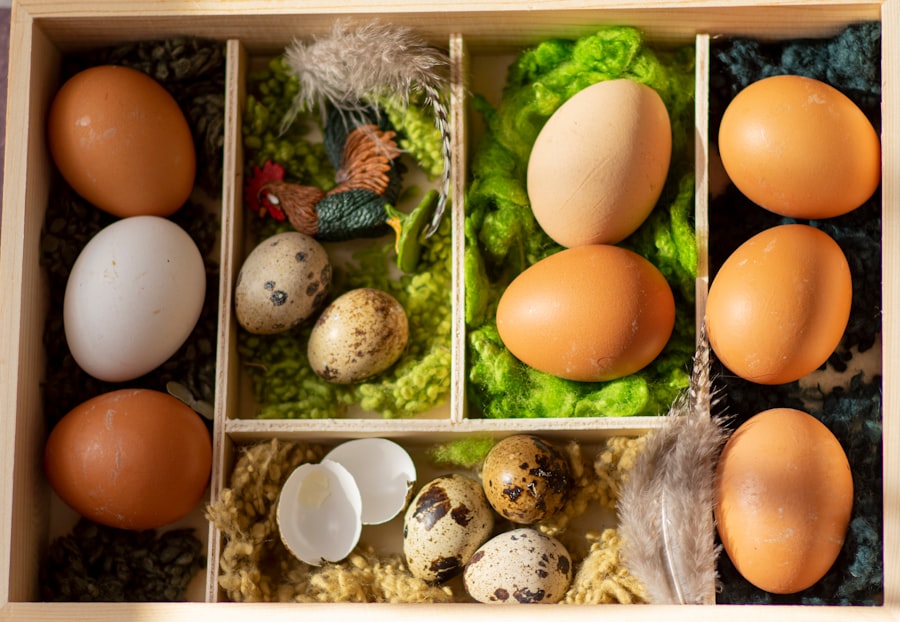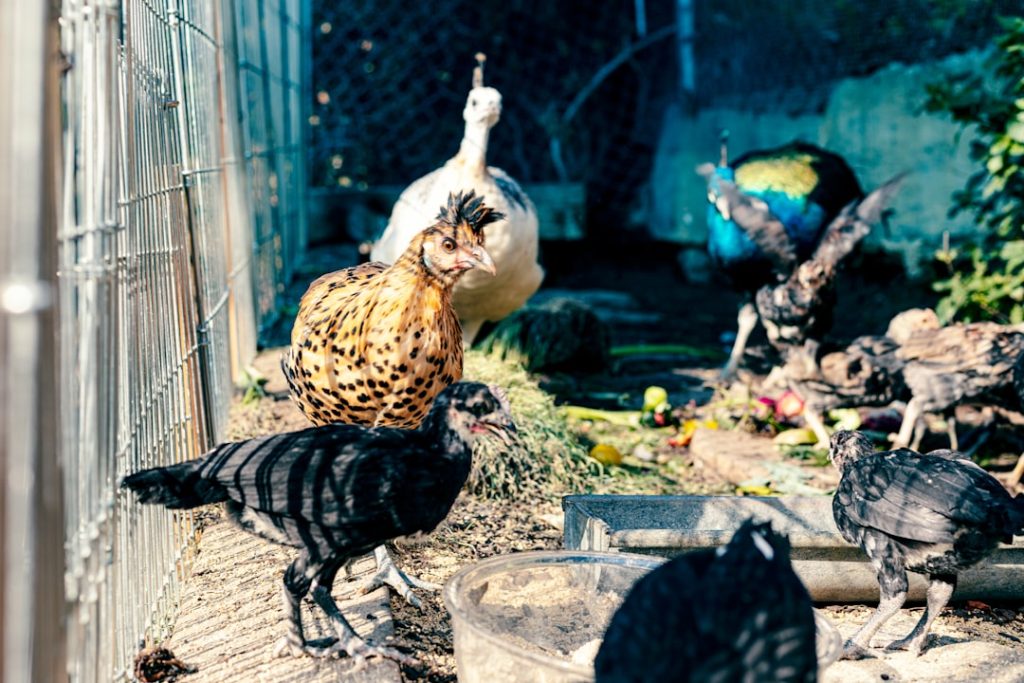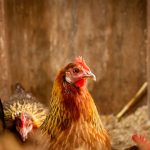Establishing a chicken coop is a necessary investment for maintaining a healthy and secure flock. Initial costs encompass the coop itself, chickens, and essential equipment such as feeders and waterers. Pre-made coops typically range from $200 to $600, depending on size and quality.
For those opting to build their own, material costs can vary between $100 and $300, based on the coop’s dimensions and design. Chicken acquisition costs fluctuate according to breed and age, with chicks generally priced between $3 and $5 each. Essential equipment like feeders and waterers can cost $20 to $50, depending on size and quality.
In total, initial setup expenses for a chicken coop can range from $300 to $1000, contingent upon coop specifications, the number of chickens purchased, and the chosen equipment. These costs are crucial to consider when planning to raise chickens, as they contribute significantly to the overall investment required for successful poultry keeping. Factors such as local regulations, climate considerations, and long-term maintenance should also be taken into account when budgeting for a chicken coop setup.
Table of Contents
- 1 Ongoing expenses
- 2 Coop and run maintenance
- 3 Feed and bedding
- 4 Veterinary care
- 5 Egg collection and storage
- 6 Miscellaneous expenses
- 7 FAQs
- 7.1 What are the initial costs of keeping chickens at home in the UK?
- 7.2 What are the ongoing costs of keeping chickens at home in the UK?
- 7.3 How much does chicken feed cost in the UK?
- 7.4 What are the potential veterinary costs for keeping chickens at home in the UK?
- 7.5 Are there any legal or regulatory costs associated with keeping chickens at home in the UK?
Key Takeaways
- Initial setup costs:
- Coop construction materials
- Nesting boxes
- Feeder and waterer
- Heat lamp or brooder
- Chickens
- Ongoing expenses:
- Feed
- Bedding
- Electricity for heat lamp
- Water
- Replacement equipment
- Coop and run maintenance:
- Cleaning supplies
- Repairs and upgrades
- Pest control
- Fencing
- Coop and run bedding
- Feed and bedding:
- Chicken feed
- Bedding material (straw, wood shavings)
- Grit and oyster shell
- Treats and supplements
- Storage containers
- Veterinary care:
- Vaccinations
- Parasite control
- First aid supplies
- Veterinary visits
- Medications
- Egg collection and storage:
- Egg cartons
- Storage containers
- Refrigeration costs
- Cleaning supplies
- Egg labeling materials
- Miscellaneous expenses:
- Incubator for hatching eggs
- Egg washing equipment
- Egg candling supplies
- Egg selling permits
- Marketing materials
Ongoing expenses
Feed Expenses
Chickens require a balanced diet to stay healthy and lay eggs regularly. A 50-pound bag of chicken feed can cost anywhere from $15 to $30, depending on the quality and type of feed you choose. On average, each chicken will eat about 1/4 pound of feed per day, so you can expect to spend around $5 to $10 per month per chicken on feed.
Bedding Expenses
Chickens need clean bedding in their coop to stay warm and dry. A bag of pine shavings or straw bedding can cost anywhere from $5 to $15, depending on the size of your coop and how often you need to replace the bedding. You can expect to spend around $10 to $20 per month on bedding for your chickens.
Other Ongoing Expenses
In addition to feed and bedding, you will also need to budget for other ongoing expenses such as electricity for heating lamps or water heaters, pest control products, and any necessary repairs or maintenance for your coop.
Total Monthly Expenses
Overall, you can expect to spend around $20 to $50 per month per chicken on ongoing expenses for feed, bedding, and other supplies.
Coop and run maintenance

Maintaining a clean and safe environment for your chickens is essential for their health and well-being. Coop and run maintenance includes cleaning the coop regularly, repairing any damage or wear and tear, and ensuring that the run is secure from predators. Cleaning the coop involves removing soiled bedding, scrubbing surfaces with a mild detergent, and disinfecting with a poultry-safe disinfectant.
You will also need to regularly check for any signs of damage or wear in the coop and make repairs as needed. In addition to maintaining the coop, you will also need to ensure that the run is secure from predators. This may involve repairing any holes or weak spots in the fencing, adding predator-proof locks to doors and windows, and installing motion-activated lights or alarms.
Overall, coop and run maintenance is an ongoing task that requires regular attention and may involve additional expenses for repairs or upgrades. Maintaining a clean and safe environment for your chickens is essential for their health and well-being. Coop and run maintenance includes cleaning the coop regularly, repairing any damage or wear and tear, and ensuring that the run is secure from predators.
Cleaning the coop involves removing soiled bedding, scrubbing surfaces with a mild detergent, and disinfecting with a poultry-safe disinfectant. You will also need to regularly check for any signs of damage or wear in the coop and make repairs as needed. In addition to maintaining the coop, you will also need to ensure that the run is secure from predators.
This may involve repairing any holes or weak spots in the fencing, adding predator-proof locks to doors and windows, and installing motion-activated lights or alarms. Overall, coop and run maintenance is an ongoing task that requires regular attention and may involve additional expenses for repairs or upgrades.
Feed and bedding
Feeding your chickens a balanced diet is essential for their health and productivity. Chickens require a diet that is high in protein and calcium to support egg production and overall health. There are several different types of chicken feed available, including pellets, crumbles, mash, and scratch grains.
Pellets are a popular choice because they contain all of the necessary nutrients in a convenient form that reduces waste. In addition to feed, chickens also require clean bedding in their coop. Pine shavings are a popular choice for chicken bedding because they are absorbent and help control odors.
Straw is another option that provides good insulation in colder climates. It’s important to regularly clean out soiled bedding and replace it with fresh bedding to keep your chickens healthy and comfortable. Feeding your chickens a balanced diet is essential for their health and productivity.
Chickens require a diet that is high in protein and calcium to support egg production and overall health. There are several different types of chicken feed available, including pellets, crumbles, mash, and scratch grains. Pellets are a popular choice because they contain all of the necessary nutrients in a convenient form that reduces waste.
In addition to feed, chickens also require clean bedding in their coop. Pine shavings are a popular choice for chicken bedding because they are absorbent and help control odors. Straw is another option that provides good insulation in colder climates.
It’s important to regularly clean out soiled bedding and replace it with fresh bedding to keep your chickens healthy and comfortable.
Veterinary care
Just like any other pet or livestock animal, chickens require regular veterinary care to stay healthy. It’s important to find a veterinarian who has experience with poultry and can provide routine check-ups as well as treatment for any illnesses or injuries that may occur. Some common health issues in chickens include respiratory infections, parasites, and injuries from predators or accidents.
In addition to routine veterinary care, it’s important to provide preventative care for your chickens by keeping their living environment clean and free from pests such as mites or lice. Regularly cleaning the coop, providing fresh bedding, and using pest control products as needed can help prevent many common health issues in chickens. Just like any other pet or livestock animal, chickens require regular veterinary care to stay healthy.
It’s important to find a veterinarian who has experience with poultry and can provide routine check-ups as well as treatment for any illnesses or injuries that may occur. Some common health issues in chickens include respiratory infections, parasites, and injuries from predators or accidents. In addition to routine veterinary care, it’s important to provide preventative care for your chickens by keeping their living environment clean and free from pests such as mites or lice.
Regularly cleaning the coop, providing fresh bedding, and using pest control products as needed can help prevent many common health issues in chickens.
Egg collection and storage

Daily Egg Collection
Collecting eggs daily is crucial to maintain their freshness and cleanliness. This habit will ensure you get the best out of your eggs when you use them.
Short-Term Storage Options
You can store eggs at room temperature for up to one week or in the refrigerator for up to one month. This allows you to keep your eggs fresh for a reasonable period.
Long-Term Storage Methods
If you have an abundance of eggs or want to store them long-term, you can consider freezing or pickling them. Freezing eggs involves cracking them into an ice cube tray or muffin tin and freezing them until solid. Pickling eggs involves soaking them in a vinegar-based brine with herbs and spices for several weeks before enjoying them as a tangy snack.
Miscellaneous expenses
In addition to the basic expenses of setting up a chicken coop and caring for your flock, there are several miscellaneous expenses that may arise over time. These expenses can include things like purchasing new equipment or supplies as needed, such as heat lamps or water heaters during colder months. You may also need to budget for unexpected expenses such as veterinary care for illnesses or injuries that may occur in your flock.
It’s important to have an emergency fund set aside specifically for your chickens so that you can provide them with proper care when they need it most. In addition to the basic expenses of setting up a chicken coop and caring for your flock, there are several miscellaneous expenses that may arise over time. These expenses can include things like purchasing new equipment or supplies as needed, such as heat lamps or water heaters during colder months.
You may also need to budget for unexpected expenses such as veterinary care for illnesses or injuries that may occur in your flock. It’s important to have an emergency fund set aside specifically for your chickens so that you can provide them with proper care when they need it most.
If you’re considering keeping chickens at home in the UK, you may also be interested in learning about different chicken coop and run plans. Poultry Wizard offers a helpful article on chicken coop and run plans to help you create a suitable and comfortable living space for your feathered friends. Understanding the necessary space and design for a coop is essential for the well-being of your chickens, and this article provides valuable insights into creating the perfect environment for them.
FAQs
What are the initial costs of keeping chickens at home in the UK?
The initial costs of keeping chickens at home in the UK include purchasing a suitable coop, feeders, waterers, bedding, and of course, the chickens themselves. These costs can vary depending on the size and quality of the equipment and the breed of chickens.
What are the ongoing costs of keeping chickens at home in the UK?
The ongoing costs of keeping chickens at home in the UK include the cost of feed, bedding, healthcare (such as worming and vaccinations), and any additional equipment or maintenance required for the coop and run.
How much does chicken feed cost in the UK?
The cost of chicken feed in the UK can vary depending on the type and quality of the feed. On average, a 20kg bag of layers pellets can cost around £10-£15, and a 20kg bag of mixed corn can cost around £8-£12.
What are the potential veterinary costs for keeping chickens at home in the UK?
The potential veterinary costs for keeping chickens at home in the UK can include the cost of vaccinations, worming treatments, and any necessary medical care for sick or injured chickens. These costs can vary depending on the specific needs of the chickens and the services provided by the veterinarian.
Are there any legal or regulatory costs associated with keeping chickens at home in the UK?
In the UK, there may be legal or regulatory costs associated with keeping chickens at home, such as obtaining a poultry license or complying with local council regulations regarding the keeping of livestock. These costs can vary depending on the specific requirements in your area.
Meet Walter, the feathered-friend fanatic of Florida! Nestled in the sunshine state, Walter struts through life with his feathered companions, clucking his way to happiness. With a coop that’s fancier than a five-star hotel, he’s the Don Juan of the chicken world. When he’s not teaching his hens to do the cha-cha, you’ll find him in a heated debate with his prized rooster, Sir Clucks-a-Lot. Walter’s poultry passion is no yolk; he’s the sunny-side-up guy you never knew you needed in your flock of friends!







